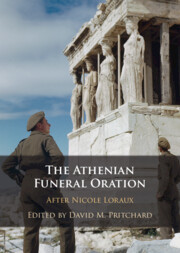Book contents
- The Athenian Funeral Oration
- The Athenian Funeral Oration
- Copyright page
- Contents
- Figures and Tables
- Contributors
- Foreword
- Preface
- Abbreviations
- 1 The Funeral Oration after Loraux
- Part I Contexts
- Part II The Historical Speeches
- Part III The Literary Examples
- Part IV Intertextuality
- 12 Imagining Athens in the Assembly
- 13 Fighting Talk: War’s Human Cost in Drama and Law-Court Speeches
- 14 Making Athens Great Again: Tragedy and the Funeral Oration
- 15 Euripides’ Erechtheus and the Athenian Catalogue of Exploits: How a Tragic Plot Shaped the Funeral Oration
- 16 ‘Back Then When the Barbarians Came’: Old Comedy and the Funeral Oration
- Part V The Language of Democracy
- References
- General Index
- Index of Sources
15 - Euripides’ Erechtheus and the Athenian Catalogue of Exploits: How a Tragic Plot Shaped the Funeral Oration
from Part IV - Intertextuality
Published online by Cambridge University Press: 11 January 2024
- The Athenian Funeral Oration
- The Athenian Funeral Oration
- Copyright page
- Contents
- Figures and Tables
- Contributors
- Foreword
- Preface
- Abbreviations
- 1 The Funeral Oration after Loraux
- Part I Contexts
- Part II The Historical Speeches
- Part III The Literary Examples
- Part IV Intertextuality
- 12 Imagining Athens in the Assembly
- 13 Fighting Talk: War’s Human Cost in Drama and Law-Court Speeches
- 14 Making Athens Great Again: Tragedy and the Funeral Oration
- 15 Euripides’ Erechtheus and the Athenian Catalogue of Exploits: How a Tragic Plot Shaped the Funeral Oration
- 16 ‘Back Then When the Barbarians Came’: Old Comedy and the Funeral Oration
- Part V The Language of Democracy
- References
- General Index
- Index of Sources
Summary
Funeral orators came to rehearse four ‘standard’ myths. The classical Athenians believed that the earliest was the victory of their ancestors against an army that the Thracian Eumolpus had led into Attica. The widely held position is that these four mythical erga were a part of the genre from its beginning. Yet, this chapter firmly establishes that this position simply does not hold when it comes to the myth about Eumolpus. Indeed, the first funeral speech to mention it was only the one that Plato wrote soon after the end of the Corinthian War. Before this, there had existed an older myth about Erechtheus, an early Athenian king, and Eumolpus fighting each other. Importantly, however, this myth presented their fight as a civil war between Eleusis, a deme in Attica, and Athens. The new myth, which, by contrast, made Eumolpus and his army foreign invaders, first appeared in Erechtheus, which Euripides wrote at the end of the 420s. As Euripides regularly changed old myths or, simply, invented new ones, Hanink argues that the epitaphic exploit about Eumolpus was originally his invention.
- Type
- Chapter
- Information
- The Athenian Funeral OrationAfter Nicole Loraux, pp. 319 - 338Publisher: Cambridge University PressPrint publication year: 2024

